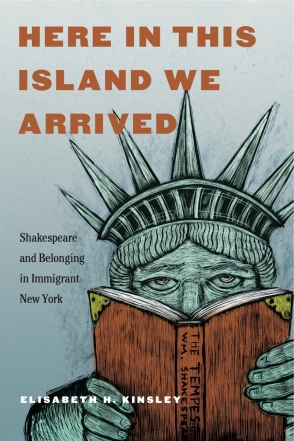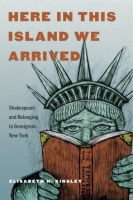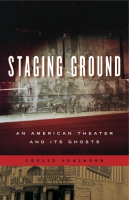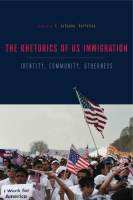
Here in This Island We Arrived
Shakespeare and Belonging in Immigrant New York
Elisabeth H. Kinsley
Here in This Island We Arrived
Shakespeare and Belonging in Immigrant New York
Elisabeth H. Kinsley
“Kinsley’s work is rich in detailed examples, and calls into question claims that Shakespearean performance in America had become, by the early twentieth century, the domain of ‘highbrow’ culture. Rather, by carefully drawing upon the multitude of Shakespearean performances in New York’s immigrant communities, this book shows that ‘Shakespeare’s meaning—and the terms of American belonging—was always in flux.’ Students of theatre, American studies, urban studies, and history will all be interested in this text.””
- Description
- Reviews
- Bio
- Table of Contents
- Subjects
As Progressive Era reformers touted the works of Shakespeare as an “antidote” to the linguistic and cultural mixing of American society, and some reformers attempted to use the Bard’s plays to “Americanize” immigrant groups on Manhattan’s Lower East Side, immigrants from across Europe appropriated Shakespeare for their own ends. Kinsley uses archival material such as reform-era handbooks, theatre posters, playbills, programs, sheet music, and reviews to demonstrate how, in addition to being a source of cultural capital, authority, and resistance for these communities, Shakespeare’s plays were also a site of cultural exchange. Performances of Shakespeare occasioned nuanced social encounters between New York’s empowered and marginalized groups and influenced sociocultural ideas about what Shakespeare, race, and national belonging should and could mean for Americans.
Timely and immensely readable, this book explains how ideas about cultural belonging formed and transformed within a particular human community at a time of heightened demographic change. Kinsley’s work will be welcomed by anyone interested in the formation of national identity, immigrant communities, and the history of the theatre scene in New York and the rest of the United States.
“Kinsley’s work is rich in detailed examples, and calls into question claims that Shakespearean performance in America had become, by the early twentieth century, the domain of ‘highbrow’ culture. Rather, by carefully drawing upon the multitude of Shakespearean performances in New York’s immigrant communities, this book shows that ‘Shakespeare’s meaning—and the terms of American belonging—was always in flux.’ Students of theatre, American studies, urban studies, and history will all be interested in this text.””
“While intrigued by this historical mystery, the author embraces rather than kicks against the unknown. Drawing on Diana Taylor’s contrast between repertoire and archive, Kinsley challenges us to concern ourselves less with the fixed data points that archival sources help us to establish and more with the larger canvas of connections we can make between this set of Shakespearean performances and the social forces that shaped them and were in turn shaped by them.”
Elisabeth H. Kinsley is an instructor and administrator at Northwestern University.
Contents
List of Illustrations
Acknowledgments
A Note About Translation and Transliteration
Introduction: Shakespeare and American Culture
1. Shakespeare and the Myth of the Melting Pot
2. Shakespearean Translations, Immigrant Adaptations, and Community Formations
3. Slumming with Shakespeare
4. The Profit of the City Consisteth of All Nations
Conclusion: This Island’s Mine
Notes
Bibliography
Index
Also of Interest
Mailing List
Subscribe to our mailing list and be notified about new titles, journals and catalogs.







